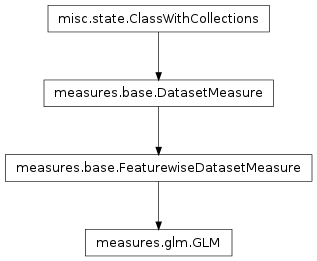This content refers to the previous stable release of PyMVPA.
Please visit
www.pymvpa.org for the most
recent version of PyMVPA and its documentation.
measures.glm
Module: measures.glm
Inheritance diagram for mvpa.measures.glm:

The general linear model (GLM).
-
class mvpa.measures.glm.GLM(design, voi='pe', **kwargs)
Bases: mvpa.measures.base.FeaturewiseDatasetMeasure
General linear model (GLM).
Regressors can be defined in a design matrix and a linear fit of the data
is computed univariately (i.e. indepently for each feature). This measure
can report ‘raw’ parameter estimates (i.e. beta weights) of the linear
model, as well as standardized parameters (z-stat) using an ordinary
least squares (aka fixed-effects) approach to estimate the parameter
estimate.
The measure is reported in a (nfeatures x nregressors)-shaped array.
Note
Available state variables:
- base_sensitivities: Stores basic sensitivities if the sensitivity relies on combining multiple ones
- null_prob+: State variable
- null_t: State variable
- pe: Parameter estimates (nfeatures x nparameters).
- raw_results: Computed results before applying any transformation algorithm
- zstat: Standardized parameter estimates (nfeatures x nparameters).
(States enabled by default are listed with +)
| Parameters: |
- design (array(nsamples x nregressors)) – GLM design matrix.
- voi (‘pe’ | ‘zstat’) – Variable of interest that should be reported as feature-wise
measure. ‘beta’ are the parameter estimates and ‘zstat’ returns
standardized parameter estimates.
- enable_states (None or list of basestring) – Names of the state variables which should be enabled additionally
to default ones
- disable_states (None or list of basestring) – Names of the state variables which should be disabled
- combiner (Functor) – The combiner is only applied if the computed featurewise dataset
measure is more than one-dimensional. This is different from a
transformer, which is always applied. By default, the sum of
absolute values along the second axis is computed.
- transformer (Functor) – This functor is called in __call__() to perform a final
processing step on the to be returned dataset measure. If None,
nothing is called
- null_dist (instance of distribution estimator) – The estimated distribution is used to assign a probability for a
certain value of the computed measure.
|
|---|

